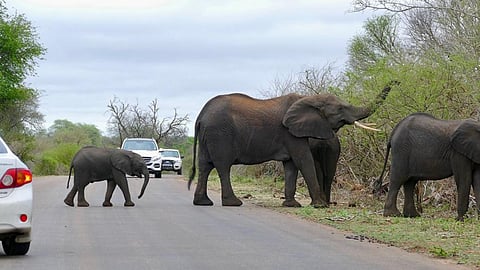

Kozhikode | Kerala Chief Minister Pinarayi Vijayan on Sunday alleged that the Central government was "not cooperating" with the state to mitigate human-wildlife conflicts.
He was speaking after launching a Forest Department project here aimed at reducing wild animal attacks in the state.
“In the last five years, compensation given in cases of death due to wildlife attack is Rs 79.14 crore,” Vijayan said.
“In the 2023-24 year, 95 per cent of applicants are given compensation. For this, only a minimal amount is given from the Central government. Even though it is written to them to increase the amount, no favourable decision has been taken by the central government,” he claimed.
The chief minister stated that the state government would not shirk its responsibility. “In the current budget, as many as Rs 70 crore have been earmarked for the projects to counter wildlife attacks,” he said.
“The central government has not positively responded to the state government’s proposals. For example, we requested them to declare wild boars destroying agriculture as vermin. But the central dismissed the request,” he alleged.
He stated that the union government’s stance was that wild animals listed under Schedules 1 and 2 of the Wildlife Protection Act, whether they are within or outside the forest, should be considered wildlife, and that the law cannot be altered.
He further said the procedures in cases of human-wildlife conflict were complex, and that the state government wanted to simplify them. “Hiding these facts, the Centre is trying to blame the state. Without realising these issues, some are raising questions against the state government. They should understand the reality,” he alleged.
Vijayan said that in the last nine years, 854 persons had died due to wild animal attacks in the state, of which snake bites outside forests caused 594 deaths. He recalled that the state government had declared human-wildlife conflict a state disaster last year.
“There are 400 panchayats in the state affected by wild animal attacks. Of this, in 273 panchayats, the issue is regular. In 30 panchayats, there are frequent wild animal attacks reported. This must be resolved at any cost. Because it is a matter of human lives,” he said.
Vijayan said conflict-prone areas had been classified into 12 zones, and various projects would be implemented based on the landscape of these zones.
“More studies are conducted into these zones. Once it is completed, a policy to reduce human-wildlife conflicts can be formulated,” he said.
Regarding preventive measures, Vijayan stated that the 1,954-km-long solar fencing laid along forest boundaries was operational, and an additional 794 km was being installed.
“There are attempts to preserve the natural habitat for wildlife within the forest. For this, the natural ponds within the forest are being revitalised, and their water supply is being ensured. Also, invasive weeds would be eliminated. Fruit-bearing trees would be planted inside the forest,” he said.
To prevent wild animal incursions, Vijayan said new Rapid Response Teams (RRTs) had been formed. “There are now a total of 28 RRTs in the state. Also, satellite RRTs based in forest stations have become operational,” he added.
On snakebite deaths, he said, “Similarly, steps will be taken to reduce the snakebite deaths in the state. As part of the initiative, the second phase of the SARPA project will be launched soon. Similarly, studies would be conducted to develop an antivenom,” he said, adding that the supply of antivenom would be ensured for all hospitals.
